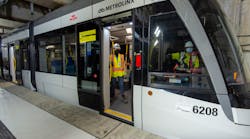TTC Board approves 2023 operating and capital budgets
The Toronto Transit Commission Board approved its operating and capital budgets for 2023. The budgets will deliver service based on new, post-pandemic ridership patterns. The budget also invests millions in new safety and cleanliness measures.
"The budget approved will ensure the TTC can continue delivering service over and above ridership levels and increase service to communities that need it. This budget invests in safety across our transit system and works to keep fares affordable for seniors and our most vulnerable residents. I am confident this budget will help to improve reliability, safety and cleanliness of public transit for all Toronto transit riders,” said Toronto Mayor John Tory.
“The 2023 budget gives us the ability to meet the needs of our customers,” said TTC Chair Jon Burnside. “This budget balances our need to deliver safe service while managing lower revenues and increased operating costs associated with inflation and new transit lines. I want to thank the TTC staff for preparing this budget.”
The TTC board approved a C$.10 (US$.07) fare increase on single cash and PRESTO rides while freezing fares for seniors, Fair Pass program users and those with PRESTO monthly and annual passes. Revenue from this fare increase, in addition to the city’s proposed subsidy to the TTC of C$958.7 million (US$708 million), will go toward ensuring the system is reliable, safe and accessible for all Torontonians. The 10-cent fare increase will come into effect April 3.
The $2.38 billion (US$1.76 billion) combined operating budgets for conventional and Wheel-Trans services include:
- More than C$4 million (US$3 million) for safety, security and cleanliness. This includes hiring 10 additional Streets to Homes outreach workers, adding 25 new Transit Special Constable positions, filling 25 vacant positions and introducing enhanced daily streetcar cleaning.
- Nearly C$3 million (US$2.2 million) dedicated to service improvements in routes serving Neighborhood Improvement Areas and expansion of the Fair Pass Program to an additional 50,000 lower income Torontonians.
- Almost C$43 million (US$31.7 million) to cover the opening of Line 5 Eglinton-Crosstown, Line 6 Finch West and the bus replacement of Line 3 Scarborough RT.
- A commitment to deliver 91 percent of pre-pandemic service levels, even as ridership is predicted to reach just 75 percent of pre-pandemic norms at the end of the year.
This year’s share of the C$12.5 billion (US$9.2 million) 2023-2032 capital budget plan is approximately C$1.34 billion (US$990 million), comprising C$800 million (US$591 million) for infrastructure and state of good repair projects, C$455 million (C$336 million) for vehicle purchases and overhauls and C$88 million (US$65 million) for transit expansion-related work.
The capital budget report also updates both the TTC’s 15-year, C$38 billion (US$28 billion) Capital Investment Plan (CIP) and Real Estate Investment Plan, a 15-year strategic roadmap that supports the CIP.
Highlights of the TTC’s 2022-2031 Capital Budget and Plan include:
- Funding for essential safety and state of good repair capital work to ensure safety and reliability of TTC’s system
- Funding to meet legislative requirements related to full accessibility of the system by 2025.
- Advancing delivery of the fleet procurement strategy for the procurement of 60 Streetcars, hundreds of hybrid and battery-electric buses and 70 Wheel-Trans vehicles.
- Continuing work on three major capacity improvement projects (Bloor-Yonge, Line 1 and Line 2).
“Transforming the TTC to meet future population and ridership growth is at the heart of our long-term capital plans,” said TTC CEO Rick Leary. “The TTC will keep Toronto moving as we come out of the pandemic, and our ridership patterns keep evolving. Most importantly, we will continue to be there for those who need us most.”
The TTC’s budget goes to the city of Toronto for final approval by the council in the coming weeks.





